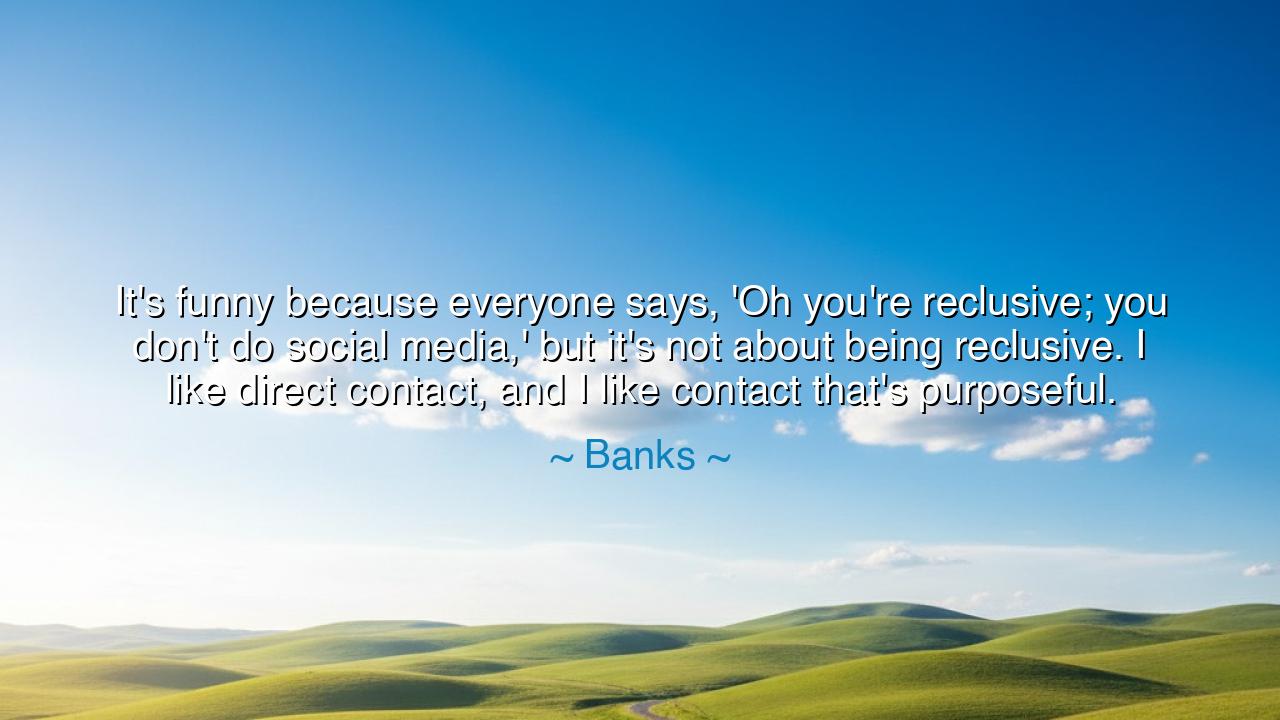
It's funny because everyone says, 'Oh you're reclusive; you don't
It's funny because everyone says, 'Oh you're reclusive; you don't do social media,' but it's not about being reclusive. I like direct contact, and I like contact that's purposeful.






“It’s funny because everyone says, ‘Oh, you’re reclusive; you don’t do social media,’ but it’s not about being reclusive. I like direct contact, and I like contact that’s purposeful.” Thus spoke Banks, the singer and poet whose voice is both storm and whisper, whose art is born from solitude and honesty. Her words speak not only of her own way of life, but of an ancient truth that our modern age has nearly forgotten: that presence is not measured by visibility, and that connection without meaning is emptier than silence. In this reflection, Banks becomes not just an artist, but a philosopher of the heart, reminding us that true communication does not need to be constant—it needs to be real.
When she says it is “not about being reclusive,” she shatters the easy labels society casts upon the quiet and the introspective. The world today equates openness with exposure, and silence with withdrawal. But Banks reveals that solitude is not isolation—it is a form of focus. She chooses not to flood her life with noise, but to fill it with intent. To her, the world of endless scrolling and shallow interaction offers the illusion of intimacy while starving the soul of substance. What she desires instead is the sacred act of direct contact—the meeting of souls that requires attention, vulnerability, and time.
The ancients would have understood her completely. The philosophers of Greece spoke of dialogue, not as mere exchange of words, but as a bridge between souls. Socrates himself sought truth through direct questioning, not through letters or proclamations, but through conversation—face to face, heart to heart. Likewise, the mystics of the East retreated into stillness not to flee the world, but to understand it more deeply. They, like Banks, saw that noise is not the same as connection, and that to hear another’s heart, one must first quiet one’s own.
It is indeed funny, as Banks says, that modern eyes mistake quiet for absence. For in an age when everyone is shouting to be heard, the one who chooses silence appears invisible, though her presence may be stronger than all the rest. The constant performance of self that social media demands has made many forget what it feels like to simply be—without audience, without applause, without filter. Yet Banks rejects this performance. Her refusal is not rebellion, but restoration—a return to what is purposeful, to communication that touches rather than distracts.
Consider the tale of Emily Dickinson, the poet of seclusion, whose words were rarely shared in her lifetime. She lived quietly, writing in the solitude of her room, and yet her poetry outlived empires. Her so-called reclusion was not a symptom of fear, but a devotion to depth. Like Banks, she understood that to create and to connect meaningfully, one must sometimes turn inward, for truth is not born in the noise of the crowd but in the stillness of reflection. Their silence, then, is not absence—it is contemplation.
In Banks’s words, there is also a challenge to us all: to examine the quality, not the quantity, of our connections. Purposeful contact means to speak with intention, to listen fully, to engage in ways that leave traces upon the soul. How many of our conversations are truly alive? How many of our gestures are rooted in care rather than habit? To seek purposeful connection is to reject the easy comfort of endless chatter for the harder, holier work of genuine encounter.
So, dear listener, let this wisdom take root in you. Do not fear silence, nor mistake solitude for weakness. Seek presence over performance, depth over display. When you reach out to another, let it be with sincerity, not with the hollow touch of convenience. Guard your attention as a sacred thing, for where it goes, your life follows.
For as Banks reminds us, the measure of connection is not how many see us, but how deeply we see. True communication does not shout—it resonates. It is not about being everywhere, but about being fully there, even if only for a single moment that is honest and whole. Let your contact be rare, perhaps—but let it be real, and in that purpose, you will find what the ancients called the essence of being: a communion of souls untouched by the noise of the world.






AAdministratorAdministrator
Welcome, honored guests. Please leave a comment, we will respond soon